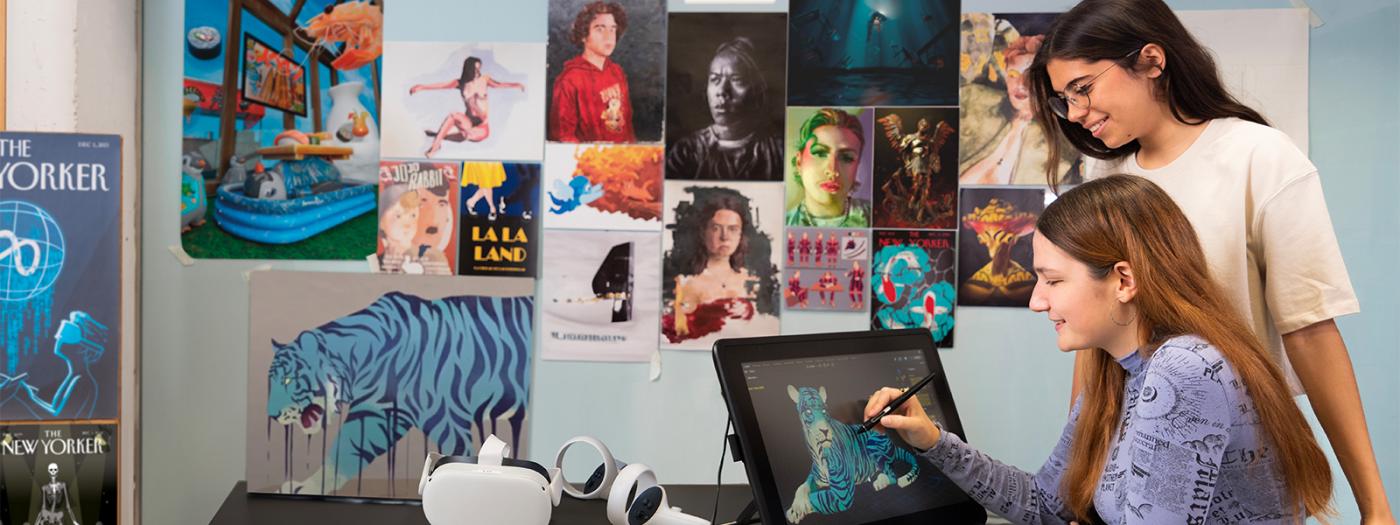In Bachelor final thesis, the student must develop a personal project during the last year of the degree, going through
the conceptualization, development and final oral presentation of the work.
With the TFG the student must demonstrate the knowledge and skills acquired during the years studied in the degree.
The student will have a tutor who will guide him/her during the course. The culmination of this work will be the defense
of the work before a panel of experts
Titular Professors
Professors
Learning Outcomes of this subject are:
RA1 The student uses digital techniques to create a work or artistic design.
RA2 The student can adequately manage the stages of creation of a digital work of art.
RA3 The student has the ability to analyze and synthesize, to solve problems and to find the best solution in a creative
way.
RA4 The student is able to communicate in oral, written and visual form the objectives, the process and the results of
the final work of the degree.
1. Course introduction
The operation of the course and the procedure to be followed in order to present the Bachelor Final thesis will be
explained.
2. How to find an idea
Different resources and mechanisms to reach an idea for the Bachelor Final thesis will be presented. Practical exercises
will be carried out to help the process.
3. Sample of reference TFG
Different reference final projects will be shown from other years or from other careers.
4. How to register the final dissertation with the secretary
The procedure to follow to register the Bachelor Final thesis through esecretary will be explained.
5. How to draft the dissertation
Research and writing methodology will be taught to correctly develop a written report of the Bachelor Final thesis.
6. How to present it orally
Different resources and mechanisms will be taught to make a good oral defense of the Bachelor Final thesis.
In the first phase, definition, the student must define the TFG. He/she will receive guidance for the creation of
the idea, it will be validated and a tutor will be assigned. This phase will end with the registration in the
eSecretary.
In the definition phase there will be a small part of lectures in which professors will introduce certain
concepts and resources related to research methodology, in order to properly develop the dissertation and its
memory.
The second phase, development, the student will carry out the work and partial deliveries will be made where
the student will receive feedback from his/her tutor. This follow-up will be evaluated by means of a grade
that will correspond to the follow-up part of the work.
There will also be workshops so that students can put into practice what has been explained in the definition
phase, in their own project. All this will be combined with the student's autonomous work, which will be
guided by individual tutorials.
In the third phase, delivery, the student will finalize the work and finish writing the report. Once accepted by
the tutor, the report will be deposited in the eSecretary.
In the fourth phase, defends, the student will prepare the presentation, to defend the work and submit it to
the evaluation of the tribunal.
MD 0: Master Class with the support of audiovisual material.
MD 1: Exercise classes.
MD4: Seminars
MD9: Peer Instruction
MD13: Just-In-time teaching
Standard evaluation:
Global quality (originality, coherence, adequacy, and results): 30%.
Instrumental level acquired: 20%.
Follow-up with the tutor (Planning and deliveries and follow-up court): 20%.
Memory: 20%
Oral presentation: 10%
Copy regulations:
In accordance with the university's copying regulations, the following is considered:
Bachelor Final thesis is highly important academic activity
Limitation and/or prohibition of AI tools: The use of AI is forbidden in this
these tools by students will be considered fraud and will involve the application of the copy regulations of La Salle
Campus Barcelona.
Special evaluation:
The student has the right to two sittings in the same academic year, if he/she does not sit the July sitting, he/she has the right to sit
the September sitting. A third call is available in February, but the student must re-register for the course. It may be submitted to a
monitoring board, provided that a request is made to the academic management
Criteria for standard and special evaluation:
If the work does not present a correct written expression, grammatically and orthographically, and the bibliography is
not well cited, following the APA norms, the tutor will not allow the defense of the work.
The evaluation criteria will be based on the originality, coherence and quality of the results according to the rubrics of
the academic guide.
A bibliography will be provided as the course progresses.
Tutors will also provide specific bibliography for each TFG.
